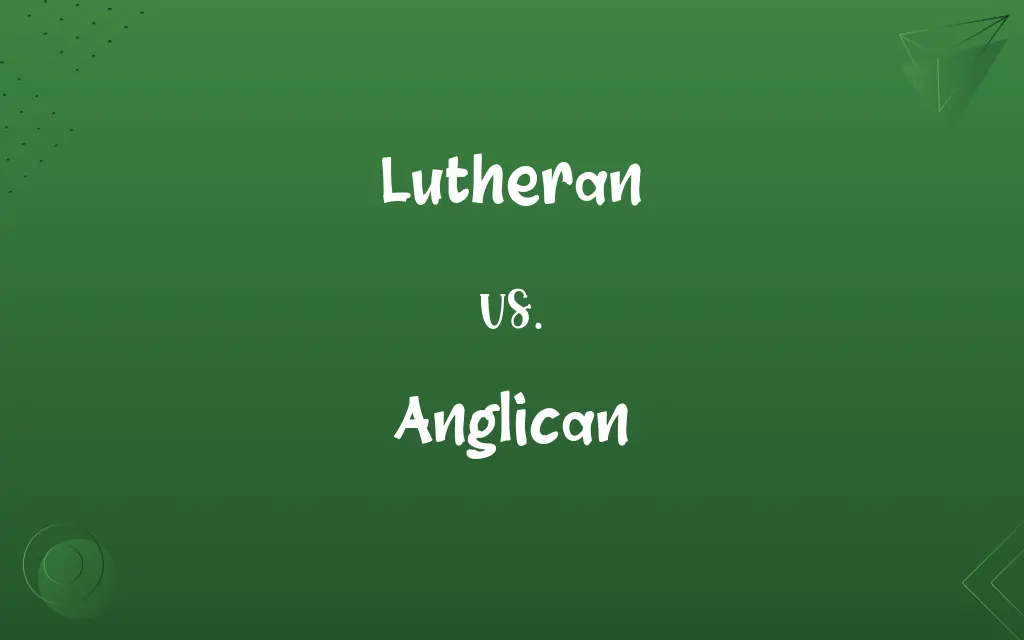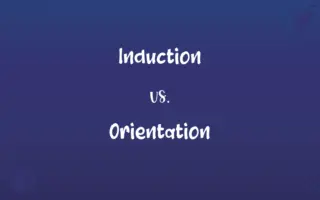Lutheran vs. Anglican: Know the Difference

By Shumaila Saeed || Published on January 8, 2024
Lutheran emphasizes salvation by faith alone, based on Martin Luther's teachings. Anglican combines Catholic and Protestant elements, originating from the Church of England's split from Rome.

Key Differences
The Lutheran Church originated in the 16th century as a result of Martin Luther's efforts to reform the Catholic Church, emphasizing salvation by faith alone and the authority of the Bible. In contrast, the Anglican Church, established around the same time, was born out of political and religious circumstances in England, with King Henry VIII's break from Rome. This split, however, retained many Catholic traditions, distinguishing Anglican practices from the more radical reformation elements seen in Lutheranism.
Shumaila Saeed
Jan 08, 2024
In terms of worship, Lutheran services tend to focus heavily on preaching and the doctrine of justification by faith, a central tenet of Luther's teachings. The Anglican Church, meanwhile, is known for its Book of Common Prayer and a liturgical approach that balances Protestant theology with traditional Catholic rituals. This results in Anglican services often appearing more similar to Catholic Mass than typical Lutheran services, which are more straightforward and focused on scripture and preaching.
Shumaila Saeed
Jan 08, 2024
The Lutheran Church is characterized by a less hierarchical structure compared to the Anglican Church. Lutheranism generally emphasizes the priesthood of all believers, minimizing the distinction between clergy and laity. On the other hand, the Anglican Church maintains a more traditional hierarchical structure with bishops, mirroring the Catholic system but without allegiance to the Pope. This structure in Anglicanism allows for a broader range of theological perspectives under a more centralized authority than is typically found in Lutheran denominations.
Shumaila Saeed
Jan 08, 2024
Lutheranism places a significant emphasis on Martin Luther’s teachings, especially justification by faith alone and the concept of sola scriptura (scripture alone). Anglicanism, while also valuing scripture highly, does not adhere to sola scriptura to the same extent. Anglicans often emphasize the "three-legged stool" of scripture, tradition, and reason as sources of authority and guidance, showing a more inclusive approach to theology and ecclesiastical practice compared to the more doctrinally rigid Lutheranism.
Shumaila Saeed
Jan 08, 2024
Both Lutheran and Anglican churches have a global presence but differ in their cultural adaptability. The Lutheran Church, with its strong focus on specific doctrinal teachings, sometimes finds it challenging to adapt to varying cultural contexts. In contrast, the Anglican Church, with its broader theological and liturgical flexibility, often shows a greater capacity for cultural adaptation. This flexibility has allowed Anglicanism to incorporate a wide range of worship styles and theological perspectives, reflecting the diverse contexts in which it exists worldwide.
Shumaila Saeed
Jan 08, 2024
ADVERTISEMENT
Comparison Chart
Origin
16th century, based on Luther's ideas
England, Henry VIII's break from Rome
Shumaila Saeed
Jan 08, 2024
Worship Style
Similar to Catholic mass, scripture-focused
Varied, uses Book of Common Prayer
Shumaila Saeed
Jan 08, 2024
Governance
Synods, congregational autonomy
Episcopal system, Archbishop of Canterbury
Shumaila Saeed
Jan 08, 2024
Geographical Spread
Predominantly Europe and North America
Worldwide, especially in Commonwealth
Shumaila Saeed
Jan 08, 2024
ADVERTISEMENT
Lutheran and Anglican Definitions
Lutheran
Relating to the Protestant Christian denomination founded on the teachings of Martin Luther.
The Lutheran church emphasizes the importance of faith and grace.
Shumaila Saeed
Dec 20, 2023
Anglican
Characteristic of Anglican theology, a blend of Catholic and Protestant elements.
The Anglican service reflects a unique combination of tradition and reform.
Shumaila Saeed
Dec 20, 2023
Lutheran
Pertaining to the liturgy or practices of the Lutheran Church.
The Lutheran service included traditional hymns and scripture readings.
Shumaila Saeed
Dec 20, 2023
Anglican
Pertaining to the liturgical practices of the Anglican Church.
Anglican rituals often include elements from both Catholic and Protestant traditions.
Shumaila Saeed
Dec 20, 2023
Lutheran
A supporter or follower of Martin Luther's teachings.
As a Lutheran, she valued the teachings of the Bible above church traditions.
Shumaila Saeed
Dec 20, 2023
ADVERTISEMENT
Anglican
Relating to the Church of England or the worldwide Anglican Communion.
The Anglican bishop presided over the diocese.
Shumaila Saeed
Dec 20, 2023
Lutheran
Of or relating to the religious doctrines of Martin Luther, especially the doctrine of justification by faith alone.
Shumaila Saeed
Dec 13, 2023
Anglican
Someone who adheres to the beliefs and practices of the Anglican Church.
As an Anglican, he appreciated the church's balance between scripture and tradition.
Shumaila Saeed
Dec 20, 2023
Lutheran
Of or relating to the Protestant denomination adhering to these doctrines.
Shumaila Saeed
Dec 13, 2023
Anglican
Of or characteristic of the Church of England or any of the churches related to it in origin and communion, such as the Episcopal Church.
Shumaila Saeed
Dec 13, 2023
Lutheran
Of or pertaining to Luther; adhering to the doctrines of Luther or the Lutheran Church.
Shumaila Saeed
Dec 13, 2023
Anglican
A member of the Church of England or of any of the churches related to it.
Shumaila Saeed
Dec 13, 2023
Lutheran
One who accepts or adheres to the doctrines of Luther or the Lutheran Church.
Shumaila Saeed
Dec 13, 2023
Anglican
English; of or pertaining to England or the English nation; especially, pertaining to, or connected with, the established church of England; as, the Anglican church, doctrine, orders, ritual, etc.
Shumaila Saeed
Dec 13, 2023
Anglican
Pertaining to, characteristic of, or held by, the high church party of the Church of England.
Shumaila Saeed
Dec 13, 2023
Lutheran
Of or pertaining to Martin Luther or his teachings;
The Lutheran doctrine of justification by faith alone
Shumaila Saeed
Dec 13, 2023
Anglican
A member of the Church of England.
Whether Catholics, Anglicans, or Calvinists.
Shumaila Saeed
Dec 13, 2023
Lutheran
Of or pertaining to or characteristic of the branch of the Protestant Church adhering to the views of Luther;
Lutheran doctrines
Shumaila Saeed
Dec 13, 2023
Anglican
In a restricted sense, a member of the High Church party, or of the more advanced ritualistic section, in the Church of England.
Shumaila Saeed
Dec 13, 2023
Lutheran
Characteristic of Lutheran theology, especially justification by faith alone.
Lutheran beliefs strongly influenced the Protestant Reformation.
Shumaila Saeed
Dec 20, 2023
Anglican
Of or pertaining to or characteristic of the Anglican church;
An Anglican Bishop
Shumaila Saeed
Dec 13, 2023
Anglican
A member of any of the churches in the Anglican Communion.
Anglicans worldwide share a common heritage in the Book of Common Prayer.
Shumaila Saeed
Dec 20, 2023
Repeatedly Asked Queries
Who was Martin Luther?
A 16th-century monk and theologian who initiated the Protestant Reformation.
Shumaila Saeed
Jan 08, 2024
What is distinctive about Lutheran theology?
It stresses justification by faith alone and the authority of the Bible.
Shumaila Saeed
Jan 08, 2024
Where is Lutheranism most prevalent?
Predominantly in Europe and North America.
Shumaila Saeed
Jan 08, 2024
How is the Lutheran Church governed?
Through synods and a degree of congregational autonomy.
Shumaila Saeed
Jan 08, 2024
What is the Lutheran Church?
A Protestant Christian denomination based on Martin Luther's teachings, emphasizing faith and scripture.
Shumaila Saeed
Jan 08, 2024
What is the Lutheran view on saints?
Lutherans honor saints but do not pray to them or view them as mediators.
Shumaila Saeed
Jan 08, 2024
What is unique about Anglican worship?
It varies from traditional to contemporary styles, using the Book of Common Prayer.
Shumaila Saeed
Jan 08, 2024
Who is the symbolic head of the Anglican Communion?
The Archbishop of Canterbury, with no direct authority over all Anglicans.
Shumaila Saeed
Jan 08, 2024
Are Anglican services similar to Catholic Mass?
Anglican services can resemble Catholic Mass but with distinct theological nuances.
Shumaila Saeed
Jan 08, 2024
How does Lutheran eschatology differ from Anglican?
Both have varied views, but Lutherans typically emphasize a more literal interpretation of biblical prophecy.
Shumaila Saeed
Jan 08, 2024
What is the Anglican Church?
A global Christian denomination originating from the Church of England.
Shumaila Saeed
Jan 08, 2024
How does Anglican theology differ from Catholicism?
It blends Protestant beliefs with Catholic traditions, emphasizing a middle way.
Shumaila Saeed
Jan 08, 2024
Do Anglicans believe in the pope's authority?
Anglicans do not recognize the pope's authority, distinguishing them from Catholics.
Shumaila Saeed
Jan 08, 2024
Do Lutherans have bishops?
Some Lutheran branches do, while others have different forms of church leadership.
Shumaila Saeed
Jan 08, 2024
What role do tradition and reason play in Anglicanism?
They are valued alongside scripture as sources of authority and guidance.
Shumaila Saeed
Jan 08, 2024
Where are Anglican churches found?
Worldwide, especially in Commonwealth countries.
Shumaila Saeed
Jan 08, 2024
Can Lutherans take communion in Anglican churches?
Policies vary, but many Anglican churches welcome all baptized Christians.
Shumaila Saeed
Jan 08, 2024
Is the Book of Common Prayer used in all Anglican churches?
It is central in most Anglican churches but can vary in its specific use.
Shumaila Saeed
Jan 08, 2024
Can Anglicans marry non-Anglicans?
Generally, yes, Anglican doctrine does not prohibit marrying outside the denomination.
Shumaila Saeed
Jan 08, 2024
Share this page
Link for your blog / website
HTML
Link to share via messenger
About Author
Written by
Shumaila SaeedShumaila Saeed, an expert content creator with 6 years of experience, specializes in distilling complex topics into easily digestible comparisons, shining a light on the nuances that both inform and educate readers with clarity and accuracy.









































































